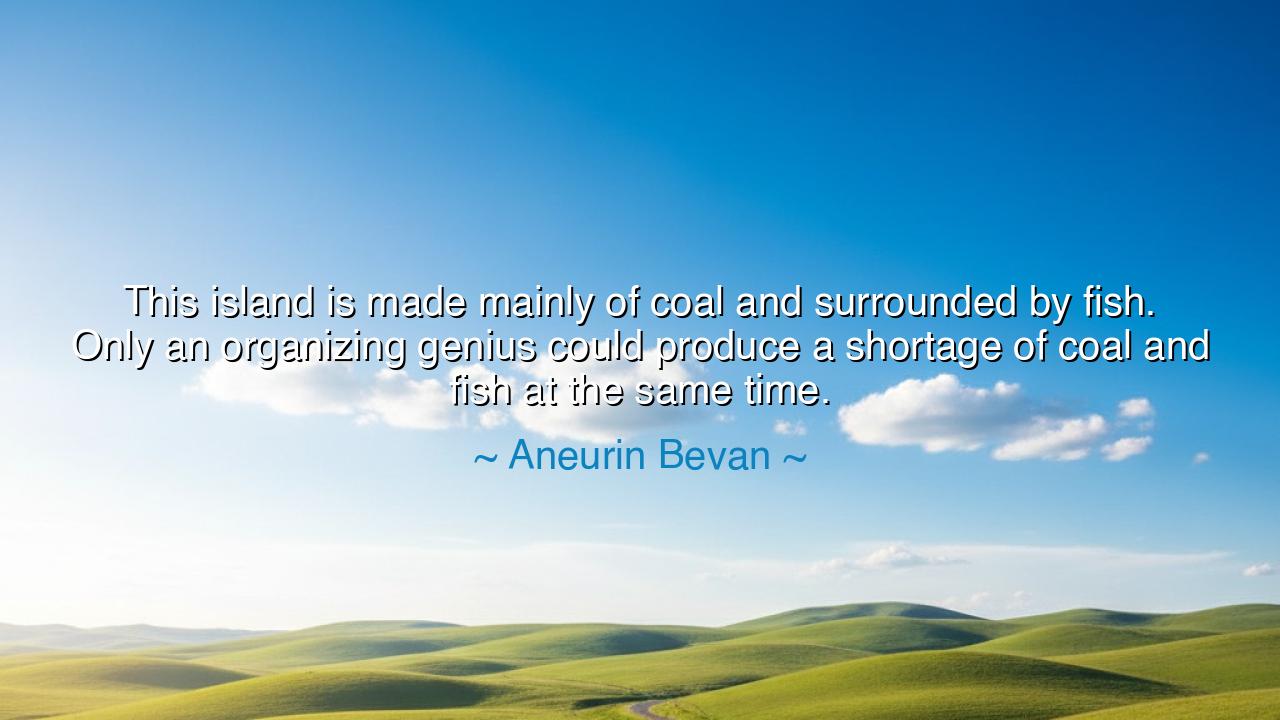
This island is made mainly of coal and surrounded by fish. Only
This island is made mainly of coal and surrounded by fish. Only an organizing genius could produce a shortage of coal and fish at the same time.






Hear the voice of Aneurin Bevan, fiery orator and champion of the common people, who declared with biting wit: “This island is made mainly of coal and surrounded by fish. Only an organizing genius could produce a shortage of coal and fish at the same time.” These words, though wrapped in humor, are heavy with sorrow, for they expose the folly of mismanagement, when abundance is turned into scarcity, and wealth into hunger. Bevan spoke not of impossibility, but of failure—failure of leadership, failure of vision, failure to use what the land and sea had already bestowed in plenty.
The ancients knew well this bitter truth: that no kingdom falls from lack of resources alone, but from the blindness and corruption of its stewards. Egypt had the Nile, yet poor rulers could bring famine. Rome had fertile fields, yet greed and misrule drained the granaries. So too with Britain, the island rich in coal, black stone that fueled the fires of industry, and surrounded by seas teeming with fish. To suffer want amidst such wealth was not a matter of fate, but of folly. Bevan’s words were a sword of irony, cutting through the excuses of the powerful.
Consider the Britain of Bevan’s time. In the shadow of war and in the long years after, shortages plagued the people. Rationing continued, industries stumbled, and the working classes bore the weight. Yet here was a land built upon coal, its mines once the beating heart of empire. Here was a coast encircled by waters abundant with fish. And yet the common family struggled to heat their homes and feed their children. Bevan’s cry was not merely criticism—it was outrage, the voice of justice demanding to know how plenty could be twisted into want.
This paradox is not unique to Britain. History is full of lands rich in resources yet poor in prosperity. Nations with gold in their mountains and oil beneath their soil have seen their people starve, while wealth flowed outward to enrich the few. The cause is the same: misrule, greed, and the blindness of leaders. The gods may provide abundance, but it is men who must manage it with wisdom, else blessings become curses. Bevan’s words remind us that poverty amidst plenty is not nature’s decree—it is man’s failure.
But hear also the deeper lesson: abundance alone does not guarantee peace, security, or justice. Without wisdom, even the richest island may know hunger. Without vision, even the strongest industry may collapse. And without fairness, the bounty of land and sea may serve the few while the many cry out. Thus Bevan’s satire becomes prophecy: the danger of a nation is not in lacking coal and fish, but in lacking leaders who will distribute them with justice and foresight.
The lesson is plain: do not take abundance for granted, and do not trust that resources alone will save a people. It is the stewardship of men and women—their honesty, their vision, their courage—that determines whether plenty becomes prosperity or scarcity. For the people, vigilance is required: demand accountability, question those who squander, and remember always that a nation rich in gifts can still be made poor by folly.
Practical wisdom lies before you: in your own life, guard against waste of your own resources, however small they may be. Do not let plenty slip into scarcity through neglect. In your communities, support those who use wisely what is given, and oppose those who squander. In your nations, demand leaders who see beyond themselves, who will not turn coal into cold and fish into famine. For abundance is a gift, but its fruits must be defended with wisdom and care.
Therefore, let Bevan’s words echo as both laughter and lament: “This island is made mainly of coal and surrounded by fish. Only an organizing genius could produce a shortage of both.” Take them as a warning for all times. Wherever you find yourself, remember that the land may provide, the sea may abound, but only human wisdom can turn gifts into sustenance. Without it, even paradise can know hunger; with it, even scarcity can be transformed into plenty.






AAdministratorAdministrator
Welcome, honored guests. Please leave a comment, we will respond soon